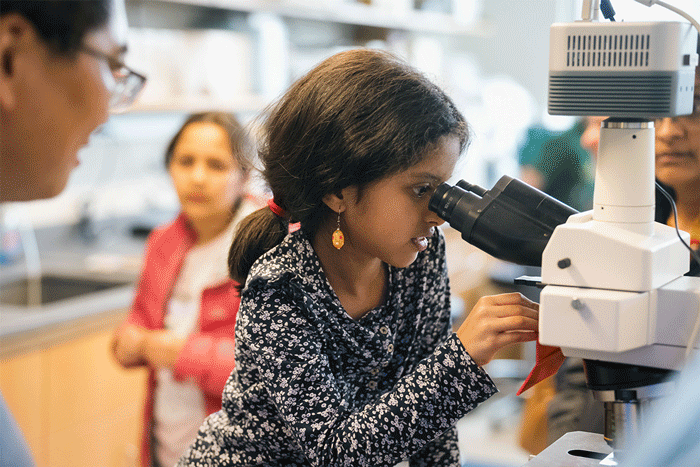Rose Mutiso ’08, Thayer ’08, who is working to bring sustainable, affordable energy systems to sub-Saharan Africa while supporting other women scientists, accepted the McGuire Family Prize for Societal Impact at a dinner held in her honor Thursday evening at the Arthur L. Irving Institute for Energy and Society.
“Your embodiment of the Dartmouth spirit characterized by generosity and a commitment to interdisciplinary collaboration and innovation is truly remarkable,” Provost David Kotz ’86, said as he presented Mutiso with a small glass globe. “Your impact in global energy and education is a shining example of the values we uphold here. Congratulations on this well-deserved honor.”
Established through a gift from Terry McGuire, Thayer ’82, and Carolyn Carr McGuire, Tuck ’83, the $100,000 award recognizes Dartmouth students, faculty, staff, alumni, or friends who are making a significant positive impact on humanity, society, or the environment.
“I don’t know what to make of this,” said a visibly moved Mutiso. “When you work in an impact space, I think part of the job description is that you shouldn’t care about recognition. That’s the whole point, that this is not what you’re doing it for. So I was really surprised, when I got the news of this award, how good it felt to be seen.”
Among her admirers, at a nearby table, sat the award’s benefactors.
“The whole idea around the prize is that you can become what you celebrate,” said Terry McGuire. “So let’s celebrate the students that have left here and gone on to have some impact on the world. Rose is a wonderful example of that.”

Carolyn McGuire added, “There are so many ways that she’s created impact, not only through her energy technology and policy research, but because she’s empowering African women to do that over and over and over again in leadership roles.”
Reframing Africa’s Energy Debate
Mutiso, who grew up in Kenya, has spent the week on campus, meeting with students and faculty at the Irving Institute, where she serves on the advisory board, the John Sloan Dickey Center for International Understanding, Thayer School of Engineering, the Institute for Black Intellectual and Cultural Life, and West House, among others.
Before the award ceremony, more than 50 people attended a lecture by Mutiso on reframing the debate on Africa’s energy future in the Institute’s Cook Auditorium. Smiling at family members in the audience, Mutiso began by thanking a long list of mentors who have inspired her work, including her father, who chaired the geography department at the University of Nairobi, and her late mother, who was an officer in Kenya’s Ministry of the Environment.
During an intellectually nourishing childhood, Mutiso said she was surrounded by thinkers and researchers. “But it was at Dartmouth that these ideas around the importance of independent inquiry were cemented,” she said.
“I got to be young and curious and hopeful—and beautiful,” she said with a laugh. “What a gift that was.”
She decided to “give back,” earning her PhD in materials science from the University of Pennsylvania, and serving as senior fellow in the Office of International Climate and Clean Energy at the U.S. Department of Energy. Her TED talks about how to bring affordable, sustainable energy to Africa have drawn millions of viewers.
Mutiso is currently research director for the Energy for Growth Hub, a Washington, D.C.-based think tank, where she co-hosts “High Energy Planet,” a podcast on how to end energy poverty.
“Poverty Is Not a Solution to Climate Change”
In her energy lecture on Thursday, Mutiso offered a searing analysis of “energy poverty,” a concept “framed in terms of light and dark, referring to the hundreds of millions of people globally who live without electricity in their homes. I have personally experienced this kind of energy poverty. In fact, I remember the candles and lamps that got us through the rolling blackouts that were life in 1990s Nairobi. And even today I have close friends and relatives that experience this kind of darkness every day.”
Mutiso rejects the widely held notion that in order to combat climate change, Africans, who consume a tiny fraction of fossil fuels, should slow the pace of economic development. Equally wrongheaded, she said, is the exclusion of local voices from global conversations about the best way to bring sustainable energy to a continent in which regional difference are often misunderstood by nonAfrican policymakers.
“Africa is not a country,” she said. “Poverty is not a solution to climate change.”
Ultimately, Mutiso concluded, “all of us, poor and rich alike, must pursue energy transition trajectories that create economic opportunities while minimizing environmental destruction. Poverty and climate change cannot be a zero-sum game.”
Mutiso said this conviction is what led her to co-found the Mawazo Institute with her Dartmouth classmate, Rachel Strohm ’08. In Kiswahili, “mawazo” means “ideas,” and the organization supports early-career women researchers working to find solutions to local and global development challenges.
Passing the Torch
Two students who participated in a question-and-answer session after her speech said they walked away from the lecture with fresh perspectives and a sense of purpose.

Brenda Wayia ’26, from Kenya, said, “I liked seeing how she took so many skills and formed something great, because as a computer science major I’m also interested in social justice and social impacts. And sometimes it’s too easy to get lost in science and not see how it will impact actual people in the future.”
Her friend, Kate Yeo ’25, an environmental science major, agreed.
“Rose really shows that building a career in community and social impact, coming out of Dartmouth, is viable. Her talk really illuminated that for me.”
Mutiso’s visit coincides with Dartmouth’s Climate and Energy Week, which continues through Saturday.


